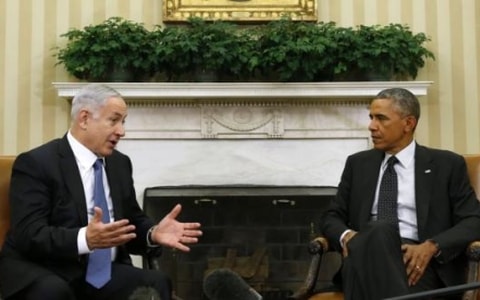US - Israel: Healing alliance relations
(Baonghean) - The alliance between the US and Israel is a relationship that is closely linked to history and tradition. Although there have been disagreements, this relationship has been considered difficult to break. However, at the present time, especially since the collapse of the Middle East peace process due to the conflict in the Gaza Strip in August, this close relationship has somewhat cracked. Therefore, the meeting between Israeli Prime Minister Benjamin Netanyahu and President Barack Obama is seen as an effort to ensure that this relationship cannot be derailed.
 |
| Israeli Prime Minister Netanyahu (left) and US President Barack Obama (White House photo) |
The US-Israel alliance was established in 1948, but the close relationship only began in 1967. It is believed that the Jewish American community has too much influence in American society in many areas such as art, media, finance, and of course politics. The US also needs a strong Jewish ally in the Middle East to protect stability in this strategic region. And the Israeli government also needs to rely on a powerful empire like the US to develop its economy, defense, and especially in territorial disputes, as well as to restrain the military and nuclear growth of countries that Tel Aviv considers enemies. In that complex and calculated relationship, there are times when it seems to have been broken due to circumstances and its own goals. Sometimes Israel takes actions that are disadvantageous to the US and is also influenced by unfavorable decisions from the US. However, almost all of those "small" things were ignored by the governments of the two countries to build close solidarity, especially strategic decisions. Remember, around the beginning of 2010, when the Tel Aviv government announced the construction of 1,600 more apartments in East Jerusalem. This area had been identified by the international community as part of the occupied territories and the capital of the future Palestinian state. The community was outraged and opposed Israel's construction of settlements here, while Israel insisted that it had the right to build anywhere it wanted in the City of Jerusalem. Israel considered Jerusalem its "undivided capital". At that time, many US officials expressed disagreement with Israel's decision, even disappointment with the policies put forward by Israeli Prime Minister Benjamin Netanyahu - who was considered a hawk. But for the benefit of both sides, they overcame that difficult and challenging time even though they were no longer as passionate as before.
However, in the context of the world situation with many complex and unpredictable changes, Israel once again made its US ally "sad" when it disrupted the Middle East peace process by using military force to attack the Gaza Strip. During the 50-day campaign, bombs and bullets took the lives of about 2,140 Palestinians, mostly children, the elderly and innocent women, and more than 11,000 others were injured. The United Nations and international human rights organizations have confirmed that up to 75% of those killed in the recent conflict in the Gaza Strip were civilians. Economically, the reconstruction of the completely flattened Gaza Strip will cost up to 7.5 billion USD and it will take up to 5 years to rebuild the original state, but on the condition that Israel completely lifts the blockade of the Gaza Strip. The war that Israel has faced fierce reactions from the international community, including the US, because it has truly caused a humanitarian disaster.
While the war has just calmed down and the international community is looking for ways to rebuild the Gaza Strip, at the recent United Nations Security Council meeting, Israel presented a plan to build 2,600 resettlement houses in "sensitive areas" in East Jerusalem. This has caused "deep concern" for its close ally, the United States. White House spokesman Josh Earnest said that the Jewish state would send a "troublesome message" if it continued to pursue resettlement expansion projects, contrary to its own previously declared goal of wanting to reach a long-term peace agreement with Palestine. Mr. Josh Earnest emphasized that Israel's actions would only cause Tel Aviv to face criticism from the international community, even pushing the country further away from its closest allies and "poisoning the air" in relations with Palestine as well as with Arab countries in the region. This shows that the disagreement between the United States and Israel is now very high. There are also inconsistent views on the Iranian nuclear issue, while the US and the P5+1 group are looking for every solution to reach a final agreement on the Iranian nuclear program. There has been no confirmation from the international community, including the US, that Iran is developing a nuclear program for military purposes. And despite all efforts by the P5+1 group (including the US) to clarify the controversial nuclear program, Tel Aviv insists that Tehran is pursuing a nuclear program for the purpose of developing weapons and is a constant threat to Israel's security.
Of course, for various strategic reasons, Washington and Tel Aviv cannot continue to have disagreements or prolonged tensions in diplomatic relations, because that would be of no benefit to either side. Therefore, the two leaders reaffirmed the "unbreakable" relationship between the two countries in a meeting on the sidelines of the 69th session of the United Nations General Assembly (October 1). Warming up relations between the two military powers is also a way for them to coordinate well with each other on issues of mutual concern, especially in the context of the world's current upheavals.
Southern Scenery
